2. Leaving America
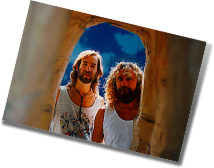
San Francisco, October 1990
October 1990
Never have I felt so disillusioned about my country of
birth, about the ability to receive justice as an
American citizen or the possibility to know the truth
in a country that prides itself on freedom of speech.
Last May I was at the home of my friends Marc and Ruth
Franklin when I heard the special news bulletin on the
radio. I felt my body washed over with a sense of doom
as soon as I heard her name jump out of the radio as
if there where invisible quotation marks pricking my
ears. I understand that most of the country won't
remember exactly what they were doing when
Judi Bari's car was bombed in
Oakland.
But this particular news involved me. The first image
in my mind was the picture of Judi's sister Martha,
whom I consider one of my dearest friends. Martha is
like a sister to me, and so Judi is my sister too.
During the many phone calls with Martha I wondered if
my conversations were being tapped by the FBI. I
arranged for Martha to stay with us while her sister
was hospitalized in Oakland. My faith in America has
been shaken beyond repair. I will never lose the sense
of mistrust I have acquired in 1990.
A few weeks ago I was arrested by a policeman in the
East Bay, not far from where Judi's car was bombed.
With the memory of Judi's experience fresh in my mind,
I was not surprised that I had been entrapped. I can't
say I was surprised when the arresting officer told me
Faggots need to stay on the other side of the bridge
in San Francisco. I was really not surprised at being
charged with resisting arrest and assault on a police
officer because I protested the unfair treatment. What
surprised me was the extent of despair one feels when
the illusions we live under are ripped away in one
swift violent moment. I am going to a psychiatrist on
a regular basis, something I never thought I would
have to do. I have had anxiety attacks, uncontrollable
vomiting in the mornings and fear of leaving the
house. When I see a police car my entire body goes
stiff until the car passes out of sight. As we prepare
to move to Berlin, it is easy now because I feel like
I'm escaping a violent relationship with the country
of my birth. I'm hoping my abusive parent country
won't be able to find me there.
The following poem was written as part of my therapy:
Forgive me by Black brothers
I thought you were the enemy
But they put me in a holding cell
And I watched you contrasted
To my vulnerability
They beat you down with humiliation
But you stood tall in your understanding
Of their ruthless game
Forgive me
I thought your disgust for softness
Was directed at me
I sat on the floor in envy
At your coldness and indifference
To your oppressor's blows
Now I understand what it means to be
"A real man"
Oppressed by the expectations
Consumed by the power of others
You only survive
In a hostile world
As I do
We are the same
Forgive me my straight brothers
I thought you were the enemy
But in my search for understanding
I discovered my own feelings
Of internalized homophobia
I was taught as you were
To hate all that was weak
And like women
Forgive me
I thought your senseless violence
Was directed at me
I lie on the ground in pain
Bleeding from your anger
Realizing that you are me
Denying my own identity
Now I understand what it means to be
"A real man"
Competing for the hearts of homophobic women
Who require you to be
Cold and insensitive to prove your manhood
Denying your softness
As I do
We are the same
Forgive me my religious friends
I thought you were the enemy
But as I watch my friends die
I am reminded of what is really important
And I am compelled to let go
To die into my new life
To be born again
Into the spirit of the universe
Forgive me
I thought your self-righteousness
Was directed at me
I cry for forgiveness
Guilty of insensitivity to the unknowing
Expecting understanding from those
Who have not walked in my shoes
Now I understand what it means to be
"A spiritual man"
Struggling in a world of false prophets
Who give you false pride
Trying to do something good
To make your life have meaning
As I did
We are the same
Forgive me humankind
I thought you were the enemy
But things got so bad
I could no longer participate in the lie
As I rose above the system
I saw the masses crying out for real life
The life they sacrificed
To the rules they blindly follow
Forgive me
I thought your insensitivity
Was directed at me
I tried to survive by playing the rules
Nurturing my ego at others' expense
Threatened by power
I too became self-involved
Now I understand what it means
"To be human"
Born innocent in a world of declining innocence
Fighting to retain it
Struggling to regain it
Wanting to remember it
As I do
We are the same
San Francisco, January, 1991
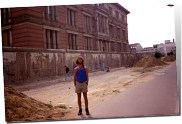
In June Rob called me from Berlin. His voice was
unusually calm, but I still detected a great
excitement in his words. He explained that he had met
a man from Sweden who sold mandalas in Mitilini on the
Greek island of Lesbos. Rob had just finished a three
week yoga intensive on the island before returning to
Berlin with one of the students. "The man is a
renunciate," Rob said, as if I knew what a renunciate
was. He explained that the man had given up all
material possessions and lived with trust that the
universe would provide everything he needed. He
fashioned mandalas out of wire and sold them to
tourists. The act of making the mandalas was in itself
a meditation on the self. In Sandskrit Mandala means
circle and in Tibetan Buddhism they represent the
bridge between conscious and unconscious. "I wish you
were here," Rob said as he began to cry. "Berlin is
the center of the universe right now. You have to be
here to understand the incredible energy being
generated by the historic events here!" Then he asked
a question that was totally unexpected. He suggested
we sell all of our belongings and move to Berlin.
Without hesitation I said yes, as if there was really
no choice. In my heart I felt I had just released
myself from pretending to live someone else's life. I
felt I was about to embark upon a private road that
was built especially for Rob and I to travel down
together.
Rob returned to San Francisco with Mandala in hand. It
was a fascinating piece of art designed to fold in
upon itself and eventually return to the original
position. In mandalas, circles represent the spirit,
the quest for centering oneself in order to operate
consciously. The young Swedish man's practice of
sitting on the street in Mitilini, selling his art,
had already transformed two lives 6,000 miles away.
The process of eliminating all our worldly possessions
was difficult in the beginning. It was a process of
eliminating layers of attachment, like peeling layers
of skin away until the bones are exposed. At the end
of the process we both realized that attachment is
nothing more than an idea that can be changed with one
thought. Those ideas are thrust into the temporal
world and made dense through fear. We had molded our
attachments into balls and chains that held us back
from potential we were about to discover in our new
freedom. All our worldly possessions could now be
placed in a backpack. We were now free to go wherever
our imaginations could carry us.
Berlin, April 1991
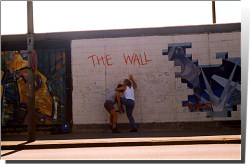
Today is the first time I have seen the Berlin Wall.
To actually physically touch it is such an
exhilarating experience. My body is consumed with the
memories of fear and death, struggle and hope, tears
of pain and joy all mixed into the concrete together.
The line that was drawn more than forty years ago
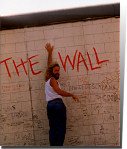 between the East and the West is evident in the void
between the East and the West is evident in the void
created between the two sides of the wall. As I walk
through this area once known as no-man's-land there is
a sense of miraculous wonder, as if the fear of being
shot is still hanging in the air, waiting to be blown
away by the winds of time. The physical scars left
upon the buildings and the land are a metaphor for
what it has meant to the people's personal lives. They
are cut in half with one half on the East and the
other half precariously dangling over the West. I have
the sense that I am participating in something of
extremely important great historic significance. I
also have the fear that it will all somehow be erased
forever.
In my heart I can feel the sense of urgency to
experience this to the fullest, to take notes, to save
the experiences for future generations. There is a
movement among some Germans to bury it all beneath
unmarked tombstones disguised as high-rise office
buildings, apartments, and parks. I morn the loss of
the memory of what was good about the East. I fear it
will all be erased in a revisionist history book that
paints everything in a black and white, good and evil
plot. As I walk into the East I have a sense of
walking backwards in time. There are no electric
signs, few telephones, no billboards, but an
incredible sense of simplicity. I feel that I as a
human being am important in the larger scheme. It is a
feeling I have sacrificed to the materialist greed of
the West. As I talk with the people it is evident that
what they wanted from the West was freedom not
Capitalism. But I sense that too will change. They
will be infected with greed and become addicted to the
concept that more is better. Their naive understanding
of the West will be tragically destroyed when they
learn that the needs of corporations will override
their personal needs. There is a sense of community
here, the kind of community that one finds among
people brought together in the aftermath of a great
disaster. There is a euphoria, a high that is doomed
to come crashing down sooner than later.
I am just a visitor, a tourist who gets to enjoy the
sunshine without having endured the difficult winter.
Like holidays should, it has given me perspective on
my own life. Would I want to live here forever?
Probably not! The question is, how long will it take
before I myself am swallowed up by the routine again?
From my privileged vantage point I can see a future
where we in the West will also sit at the ruins of our
own Berlin Wall. One day the Capitalist part of the
Cold War illusion will also come crashing down. Like
the citizens of the former Soviet Union, we will
realize that we were nothing more than pawns of a
small elite class who steal from the labor and trust
of the masses. The great illusion of our way of life
and freedom will not spread across the world like
wildfire. American workers and workers in the West
will watch their pensions, their wages, their rights
and their futures downsized to fit the needs of
corporate interests. The Robber Barons are poised to
return us to the nineteenth century as we enter the
twenty-first century. The way they treat the East
Germans is the way they will treat us all in the end.
It is obvious they are interested in profits, not
freedom or democracy!
Berlin, May, 1991
Our first days in Berlin are in the Bohemian
neighborhood, Kreuzberg. We live with Camilla
O'Callaghan, an Irish yoga teacher Rob had met on
Lesbos. The flat is above a Turkish bakery and produce
market. The steps that lead up to the third floor sag
in the middle as if a million boots have worn them
down over a century of wear. Everything looks old and
dirty. I was surprised at my indifference to the
imperfection. The dirt and the imperfection are all
necessary to the ambiance, the old world charm.
We are just a few minutes walk from Warschauerbrücke,
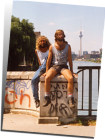 a bridge which had once been a checkpoint between the
a bridge which had once been a checkpoint between the
East and West. I remember feeling fear about crossing
the bridge, but I was aware that giving into that
emotion was not an option. I preferred to see it as
excitement. I walked through the fear and came out in
a place that filled me with the wonder of a child.
Every step I took was with the knowledge that I was
participating in an historical event. We walked across
the Warschauerbrücke at dusk, leaving the lights of
West Berlin behind us. The streets of East Berlin were
dark, but without threat. As Camilla led us through
the deserted streets I had the feeling we were in the
Berlin after the allied bombing in 1945. We came to a
building that looked as if it had taken a direct hit.
People were standing in the street outside. There was
loud music coming from the first floor. Inside was a
disco that had been constructed just days before.
These were common after the wall came down. They
would continue until someone came to tell them they
had to stop. It was a kind of anarchy that had filled the
void left with the collapse of the DDR. We were all
children playing in the absence of adult supervision.
We savored every moment with the knowledge that it
could all be taken away im einen Augenblick (in the
blink of an eye). It was a time and experience that
would never come again.
On the Berlin U-Bahn (subway) map you can see the
 Berlin Wall represented by a broken line. Our
Berlin Wall represented by a broken line. Our
apartment is one block from the Schlesisches Tor
station at the end of the number one line, represented
by a green line on the map (below center, right side
of the map). We live in a neighborhood that was
surrounded by the Wall on three sides. Before the
separation of Germany, Schlesisches Tor was a station
on the line to Warschauer Strasse. In 1991 the tracks
end in mid air as if they had been severed by a great
knife that cut the city into pieces like a cake. To
the west of the apartment was Görlitzer Bahnhof
station where a park had been constructed on the
grounds of the former site of a major railway station
that led to the East. The railway bridge still crossed
the river and was another major link that was heavily
protected during the days of the Wall. The most
interesting thing about a neighborhood like Kreuzberg
was that everyone had an interesting story about life
with the Wall!
Some day when I read my notes I hope I can remember
the feelings I now have inside my heart. It's a good
idea to keep a journal that chronicles all the times
and physical events that compose this magical journey.
But they will be useless if I forget the spirit in
which this journey is traveled. For the first time in
my life I am the foreigner (Ausländer). I cannot walk
out the door onto the street with one ounce of
confidence that there will be anyone who understands
"where I'm coming from." It's a humbling experience to
be forced to face who you are and what you truly
believe, without the chorus of one's fellow citizens
keeping you on the "right course." The most freeing
aspect of being a foreigner is the lack of
expectations from those around you. If I do something
absolutely outrageous, no one will notice. The Germans
will simply look at me assuming that's probably the
way they do it in America. The thing I feel the most
is the responsibility of total freedom. With no one
looking over my shoulder I have to set my own
boundaries. I almost feel anger in the recognition of
how many of my ideas and actions were not mine at all.
I was simply doing what was expected of me. I have
this incredible fear that I will return to America and
my own people will hate me. What will they think when
I tell them there are places in the world that in some
ways offer more freedom than America?
Saturday, May 11, 1991
On this beautiful warm spring day we decided to take a
stroll across the Görlitzer bridge to Treptower park.
We sat upon a blanket for a traditional picnic lunch.
It could have been my hometown Danville in 1956. I
felt extremely lucky to be participating in an
experiment that we all knew would soon vanish forever
from the realm of possibilities. I couldn't help but
notice everyone staring at us as they passed by on a
nearby path. As casually dressed as we were we still
stood out because everything we owned was from the
West. After lunch we went to ride a ferris wheel. From
the top Rob and I got the first glimpse of Berlin from
the perspective of the East Berliners. Even five
months after the reunification we could still see the
outline of the wall. There was a stark contrast
between the tree lined streets of the West and the
barren "no man's land" that buffered the Wall. The
landscape looked as though two very different artists
with two very different ideas of style had shared
opposite halves of the same canvas.
June 5, 1991, Prague, Czechoslovakia
What a beautiful city. Prague suffered very little
destruction during the war, so there are buildings
that date back to the 13th century. There are places
in the center of the city where it's possible to
believe you are in the 13th century. There are more
Americans here than I've seen anywhere we have
traveled. The prices for food are unbelievably low,
but the difficult thing is finding food. We treated
ourselves to breakfast buffet at the Intercontinental
Hotel for $10. It was worth every penny! Strolling
through the shops is like shopping in the States in
the 1940's. But the shelves are practically bare and
what you see in the shop windows is usually the entire
inventory of the shop.
People here are very political and are proud of their
historical attempts to stand up to the Soviets. What
is apparent here in Prague is the failure of the West
to anticipate what people behind the "Iron Curtain"
really wanted when the wall came down. If we had come
in with a humanitarian perspective we would have known
that building an infrastructure to support all the
basic needs would give us the biggest advantage at
building strong democracies. The biggest complaints I
hear are about the obvious motives of the West. We are
only interested in the potential to make profits from
these people and we believe that the advantages of
Capitalism will trickle down to them. We do not
understand that they have a different perspective of
Socialism than we do. We come acting more like a
conquering army than like friends! Prague will do
well. We will turn it into an American city. Already
the tourist center looks more like a Disneyland
replica than a real 13th century city. Sometimes I
feel more comfortable in the places that aren't so
perfect!
Berlin, June 7, 1991
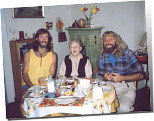 Last summer, the Ostmark, or East German Mark had
Last summer, the Ostmark, or East German Mark had
been eliminated. Prices in the East were still much lower
than in the West. I wondered how they would ever be
able to bring them to parity. On our subsequent trips
to the East I began to feel empathy and recognize an
affinity with the East Germans. That recognition of my
childhood during our picnic in an East Berlin park
stirred up a lot of memories of what had been
eliminated from my own life as I had watched the world
change around me. In the presence of the great
experiment of reuniting two cultures separated for 40
years, I was given the privilege of seeing both
cultures very clearly.
One thing both East and West Germans agreed upon was
that the American perspective of their great
experiment was extremely flawed! Both had lived with
the Wall for four decades and understood the
intricacies and nuances of a divided society. Both
were quick to point out that they were the ones who
brought the Wall down, not Reagan! The most revealing
aspect for myself came through the stories of what the
East Germans wanted, what they had longed for those
forty years behind the wall. It was not the black and
white, simplistic Cold War fairy tale offered by
American network newscasts. It was something that was
made even more evident as the hungry greedy
capitalists descended upon them, eager to line their
own pockets because of what they saw as a new market
for selling consumer goods.
I was touched by the stories of the East Germans. As
an American, I too had believed in the fairy tale of a
desperate people behind the "iron curtain" longing to
go shopping. That image was bolstered by the coverage
of East Germans filing through West Berlin department
stores in awe of the abundance and assortment of goods
for sale. As we had watched CNN from American living
rooms we saw the East Germans as reflections of
ourselves. We imagined what they were saying and what
they would feel and believe based on our perspectives
from our own lives.
I found myself in a personal crisis as I listened to
the East Germans tell their own stories. They
threatened everything I had believed growing up in
America. Had I been listening to their stories in the
comfort of an American living room I might have been
able to brush it off casually. If my own life was not
being turned upside-down with the extremely personal
transformational act of living in Berlin, I might have
been able to avoid the great awakening of my
consciousness. I was put in the difficult position of
admitting that the culture I grew up in was only a
tiny fraction of a vast world of diversity and
differing opinions. I was forced to admit that the
black and white lines we Americans drew between right
and wrong were really vague lines of ignorance that
could quickly be erased with the right experience and
information.
There was one thing East Germans longed to buy more
than anything else after the Wall came down. Bananas!
In the months after the Wall was opened it was
impossible to find bananas in West Germany. The thing
East Germans wanted the most during those forty years
of isolation was freedom! Freedom to think for
themselves, freedom to move about without
restrictions, freedom from fear of reprisals from a
totalitarian government, freedom of religion. The
difficult and surprising thing for people in the West
to hear and understand was the idea that there were
things the East Germans liked about their lives. They
liked job security, universal health care and the
sense of community that comes from a culture devoid of
"extreme" capitalism. Like it or not, a totalitarian
state like the oppressive East German DDR created a
place where family and personal relationships were the
most important thing. For me, as an American and a
Westerner, I was forced to admit to myself that I
longed for what they had in that realm. The East
Germans knew that part of their lives would be
destroyed by the kind of extreme materialism that had
separated them from their West German counterparts. I
mourned with them in this knowledge.
July 10, 1991 Berlin,
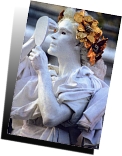 Rob and I have met a young Brazilian named Marcylio
Rob and I have met a young Brazilian named Marcylio
who performs each day in Breitscheidsplatz on the
Ku’damm. He dresses in a toga, powdered wig and white
clown make-up, then stands motionless for up to five hours
in what he calls a state of trance. Marcylio seldom moves
during the five hours of performance. Rob has volunteered
to assist Marcylio in his daily performances. He is excited to
get a chance to speak Portuguese, one of his majors at
Georgetown University. We are both fascinated with the
unbelievable energy and spirit of this Brazilian magician
(healer). Marcylio says he has come to Germany to help
them heal, to bring them sunlight and spirit.
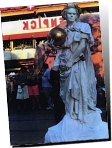 After the first few days of observing Marcylio’s
After the first few days of observing Marcylio’s
performances from among the crowd, my attention has
now turned to the Germans who are drawn to his silence.
The act of doing “nothing” is a revolutionary act in Germany.
I can see it on the faces of many of the spectators. Some are
confused, bewildered, perhaps even angry. Others seem
uneasy, laughing or ridiculing Marcylio. Rob cautiously steps
between them to diffuse any possible escalation. At the end
of the day though, Marcylio’s collection plate is filled with
German Marks from appreciative spectators who
understand the true nature of his art.
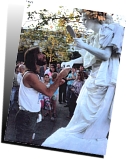 I have learned something of Brazilian culture in knowing
I have learned something of Brazilian culture in knowing
Marcylio. His friends perform a traditional Afro-Brazilian
dance called capoeira. It’s a combination of martial arts,
gymnastics and dance that was developed by African
slaves as a means of self-defense. I sense an incredible
energy emanating from Marcylio and all of his friends.
Watching them interact with each other creates an unease
in myself that underscores my own German origins passed
through generations of German-Americans. The Germans
who observe the capoeira are very different from those
who find it difficult to understand Marcylio’s meditation.
I assume they simply accept it as dance without
questioning its purpose.
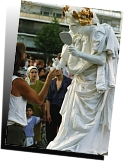 Marcylio wants us to come to Brazil for the winter.
Marcylio wants us to come to Brazil for the winter.
He lives in the rain forest where he says Shamans and
Mystics are common and legal. The compelling part of his
explanation of Shamanism is the idea that death is a teacher
or guide that calls one to be a Shaman. Having arrived
directly from ground zero of the AIDS epidemic, Rob and I
are both open to this interpretation. When Marcylio touches
me I can feel warm nurturing energy flowing through his hands.
There is an immediate sense of total trust. There is a saying
among Shamans. “Death is the best teacher because he is
the only one who will never tell you a lie.”
Berlin, July 24, 1991
Today Rob and I spent the entire day doing a photo
shoot in East Berlin with a Greek photographer named
Apollo. We began our shoot in Kreuzburg, crossed the
Warschauer Brücke to the East Side Gallery and then
moved on to Alexanderplatz. It was exactly the right
thing to do as we prepare to leave for the Greek
islands in a little more than a month. We both decided
that the best photographic representation of our
Berliner transformation would have to be in East
Berlin!
Berlin, August 15, 1991
It was on the morning of August 12, 1991 that we
received a large package from our friend Gary in San
Francisco. It was filled with newspaper articles and a
long letter filling in all the details of life in San
Francisco without Rob and Bob. We spread the newspaper
articles over the floor in Rob's Acherstrasse
apartment and were reading to each other. I smelled
smoke and thought perhaps Rob had left something
cooking in the kitchen. I checked the kitchen then
returned to the newspapers after I found everything in
order. Suddenly we heard loud footsteps in the
hallway, then someone banging on the door yelling,
"Feuer, Raus!" Then we heard Elke yell, "Rob, Bob get
out, the building is on fire!"
I ran down to my apartment one floor below and grabbed
my backpack with all of my manuscripts. As I lifted
the bag it opened and all of my papers fell onto the
floor. I looked out into the courtyard through the
window where I could see large pieces of burning wood
falling in front of the window. I quickly packed the
papers into the bag and ran through the courtyard
dodging the falling debris. As I entered the street
and turned back toward the building I could see the
flames and smoke billowing into the sky. I searched
for Rob in the crowd and could not find him. I found
Elke in the crowd. She told me Rob had not come out
yet. I was hysterical as I tried to run back into the
building. I was held back by the firefighters.
I could not imagine what I would do if anything
happened to my Robby. It's amazing the multitude of
things you can process through your brain in a moment
of panic. Finally I saw Rob emerge through the
entrance escorted by two firemen. He was carrying
everything he owned neatly packed into his bags. He
had been at the back of the building where he could
not see the smoke and flames. He had been unaware that
the only way out would become completely blocked just
minutes after he came out into the street. It is only
in hindsight that I can appreciate how traumatized I
was in those moments before he emerged from the
burning building. I was able to draw upon the familiar
illusion that bad things only happen to other people,
not to us!
Berlin, August 19, 1991
This morning we awoke to the news of an attempted
coup in the Soviet Union. We are glued to the TV,
watching the events unfold on CNN. Suddenly those
Russian soldiers in East Berlin don't seem so harmless
anymore. Here in Berlin it seems we are in the middle
of everything that's happening. I have lost my
innocence! No need for Germans to accuse me of being
a naïve American any longer. I have been educated in
these past few months. I remember how threatening it
seemed when Camilla suggested we live in an East
Berlin besetzteshaus. That first night crossing
Warschauer Brücke into the darkness of East Berlin
seems so distant now. In just a few months they have
been able to illuminate the darkness with neon signs
glaring from sparkling new Western style shops.
Perhaps they wanted to change it quickly so a coup
would be less likely to succeed. Now that it has been
"Westernized" my fear has been replaced with sadness,
as though something valuable has been lost. I long for
those timeless strolls through dark streets.
Nothing has been more life altering than the stories
told by survivors of Nazi rule. There have been nights
when I woke up in a panic from nightmares that were
too real, my sheets soaked with sweat. My personal
process is one of awakening. I want so much to hang on
to all of my American idealism that makes Germans see
me as naïve. I want to believe that the core of all
human beings is goodness. But as each experience
passes through my heart I have to acknowledge that I
really was naïve! No matter how good we claim to be or
want to be, there are situations where average people
turn into monsters that epitomize the concept of evil.
It is much more difficult to separate oneself from
reality when the pictures on the TV tube are the same
pictures just outside your doorway. It is much more
difficult to imagine myself separate from the stories
being told when the storyteller is holding my hand.
Berlin, August 1991
I am affected intensely by every trip into Eastern
Europe. The fact that they existed under Soviet rule
for forty years, so close to the West, has created
this unbelievable sociological microscope. Ulf and
Joachim's friend Gesine was able to reclaim her
family's home in East Germany. She decided to allow
the people who have lived there for decades to remain.
She built a small summer cottage on the back of the
property where she can go on weekends to escape
Berlin. Rob and I accompanied Ulf and Joachim on one
of their Sunday visits.
But not everyone operates from their heart during this
great transition. I spoke to a man who told me he was
angry that a Western company was allowed to build a
water treatment plant in his village. His water comes
from a well, but now he is required to pay to have his
house connected to a system where he will be forced to
pay for water so some Western company can make a
profit. I see all of these Western corporations
descending upon the East like a plague of locust,
waiting to privatize everything like water and
healthcare so they can make profits. Through a
translator I spoke with a young man who was handing
out free Philip Morris cigarettes to young 12 to 14
year old boys. He told my German friend that he was
specifically instructed to target young boys because
they would be the wage earners of the future. They
want to take advantage of the lust for everything
American. From this vantage point the concept of a
"free" market seems more like the freedom to steal.
Sometimes I feel a great sense of shame!
Athens, September 4, 1991
This is absolutely the first time I can use the word
exotic with real substance. There are moments when
it's really hard to convince myself that I'm still in
Europe. After months in Berlin the contrast is
overwhelming. Even though the city seems physically
more disorganized and chaotic, the sense is that the
Greeks don't take anything seriously like the Germans
do. The lack of order and expectation is refreshing!
People seem to go out of their way to be nice and
helpful.
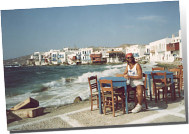
Mykonos, September 6, 1991
Not since my trip to Bimini 25 years ago have I seen
such a beautiful ocean. It is so good to be far from
civilization, separated by a vast body of water. In a
meditation I realized I have come home in a sense. If
I am going to be free it will happen here. If my
spirit is to be allowed to soar, this is my chance.
There is a part of myself that wants to hang on to the
familiar, but beyond these feelings of anxiety I am
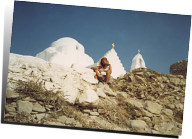 sure there is a world of unimaginable peace and
sure there is a world of unimaginable peace and
harmony that awaits me. Mykonos is too tourist
oriented. I am hoping Crete will provide more
isolation and less financial drain.
Tuesday September 10, 1991
Mykonos - Paros - Santorini - Crete
We are on the last leg of our trip on the ferry to
Iraklion, Crete. We are making the trip with a couple
from East Germany on their first Greek holiday.
Thorsten and Iris give me an interesting perspective
on the Greek culture that I would probably miss if I
were traveling with other Americans. They have
infected me with their need to submerge themselves in
every aspect of what it means to be Greek. They
observe everything with what seems to be genuine
curiosity, then attempt to participate with the
passion of a real Greek. I can't help but watch them
as if they are teaching me how to be a traveler
instead of a tourist.
The entrance into the harbor of Santorini was magical.
Each time we enter a port they play music straight
from the movie, Zorba the Greek! Every time the music
begin Thorsten and Iris begin dancing on deck. Never
has the sense of adventure been so genuine! I am
afflicted with a peculiar mood that keeps my mind
focused on what I am about to give up. Is it my
innocence or my internment in someone else's dream
(life)?
Phoenix, Crete, September 11, 1991
We arrived in Loutro in a small fishing boat we rented
with a few other tourists. Since Loutro has no roads
the only other alternative would have been a three
hour hike along a coastal mountain trail. All the
rooms in Loutro were full. We carried our bags over
the hill to the next cove called Phoenix, where Saint
Paul is said to have landed on his trip to Greece.
This is much harder than we thought it would be. I
think we are in detox mode. I can't help but focus on
all the things I miss, all the things I am giving up.
There is a part of me that wants to run back to the
life we have left behind, but a bigger part of me
can't be bothered to expend the energy it would take.
I can also remember this feeling from selling all our
possessions before coming on this adventure! I found I
was wrong about my attachment to "things." I'm sure
what's going to be on the other side of this "letting
go" will be just as rewarding. It's like a fast. The
first three days are the hardest.
Tuesday 15 Oct 1991
Loutro, Crete
Rob has been very sick for the past two days, probably
from food that was left in the hot sun without refrigeration.
A few days ago Rob came down from the castle ruins
with a drawing I accused him of tracing. I had no idea he
had the ability to draw! He’s excited now, buying supplies
from the mini-market and drawing everything in sight. Now
he’s drawing the olive trees on the path to the castle. I’m
impressed with the datail. He can’t wait to write to Mark
and Beth to tell them of his new found talent!
Loutro, October 23, 1991
Rob continues to amaze me with his pencil sketches of
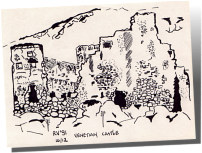 the castle and the olive trees on the path leading to
the castle and the olive trees on the path leading to
the castle ruins. When he arrived with the first
sketch of the castle I didn't believe he had drawn it
freehand. How could someone with absolutely no formal
art training reproduce such an accurate representation
of an object? Today I couldn't help but think of Judi
and the old growth redwoods back in California. I can
remember the first time I stood in the presence of a
giant redwood tree. Just the thought that it was a
living thing that stood even before the birth of
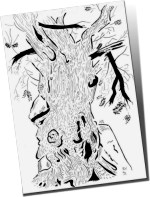 Christ is in itself an awesome experience. When I
Christ is in itself an awesome experience. When I
touched it for the first time my eyes filled with
tears. I am sure it was not my imagination. I was
swept away by a feeling of intense peace and
contentment. I could feel the vibrations of centuries
of life and death witnessed beneath its branches. I am
sure every person who stood beneath it before me left
some message for the tree to carry on to future
generations.
Each morning I watch our landlady Pandalitza attend to
the small Greek Orthodox alter box where she lights a
candle. Then she walks through the gate up the path to
the 1000 year old olive tree that Rob has drawn today.
She closes her eyes, gently touching the tree as if
she is communicating with her ancestors. Like the
redwoods, these trees speak to me also. I remember the
horror of seeing the first bald mountaintop in
Northern California after it was clear cut by a greedy
timber company. They only see money, thinking we are
crazy to want to protect them. These trees are part of
our family of living things. All indigenous cultures
knew the connection of ritual to survival. If we cut
down all the trees we are cutting away the futures of
all the children who come after us. This is the
message the trees have given to me!
Wed 23 Oct 1991
Joel and Kim from San Francisco left today. We are
preparing to leave in two days, back to Berlin.
Thursday 24 Oct 1991
Met Joel and Kim in Hania. They were distraught. There
was a fire storm in the Oakland Hills and they are unsure
of the fate of good friends who live there. The story is in
all the press here. Makes one realize, no matter how far
we travel from home, the heart connection is still there.
Friday 25 Oct 1991 - Sat 26 Oct 1991
Slept overnight in Athens airport to catch early morning
flight back to Berlin via Frankfurt. NEVER AGAIN!
Sat 26 Oct 1991
Back in Germany. Unsure what comes next???
For me, maybe Africa!
Berlin, November 16, 1991
After two months in Greece, on the island of Crete we
have returned to Berlin. In Loutro we had absolutely
no contact with the outside world. There were no
radios, TV or even newspapers. It was unbelievably
healing! Now we are back in Berlin with access to CNN,
The International Herald Tribune and Armed Forces
Radio which carries Morning Edition and All Things
Considered. On December 3rd, I will be leaving for
Africa. Rob will stay behind in Berlin.
I am haunted constantly by voices from my past who
said, "America may not be perfect, but it's the best
the world has to offer!" After living here and talking
with many Europeans I would agree to that statement
from certain perspectives. What I love about America
is the sense of personal freedom we carry with us
through our lives. What troubles me is that I have no
desire to return to the States though. I feel the rest
of the world is looking to us for guidance in
attaining that kind of personal freedom while we are
fighting to keep it from being taken away. I feel more
hope in a place that sees this aspect of freedom in
their future.
I have a growing fear that we as Americans are going
to give it all away in our complacency and our ever
growing addiction with materialism. Sitting here in
Berlin is like walking back to the America of forty
years ago and bringing along the memories of all the
mistakes we made in those forty years. What I see when
I stand on the border between the two factions of the
Cold War is a danger that the United States will trade
its form of democracy for a kind of economic fascism.
Most of my German friends have no TV. I don't believe
most Americans could imagine what it feels like to
spend a lifetime without TV advertising telling you
how to dress, what to eat, what to buy and how to
think. When I walk through the streets of Berlin I see
a form of individualism that surpasses what we know in
America. Even though we have a unique sense of
personal freedom that we carry inside us, we seem to
be required to live in ghettos of like minded people.
I can't help but notice the lack of conformity that
comes with a lack of commercial advertising. I see the
commercial, corporate aspect of American life as the
major threat to everything we hold dear. When I see
lines outside McDonald's restaurants I feel it's only
a matter of time before the entire world is one big
corporate ghetto.
The greatest thing about my position in life is that
I'm not a part of anything. I feel like an astronaut
floating above the earth with this fantastic overview.
I'm not constricted by the concepts of time, seasons,
borders, governments or religions. I see all these
people wallowing in their own crap and they only see
other people's crap, not their own. The thing that
Germany has taught me is that governments are only
half the problem. To be a really good oppressive
government you must have a population that's really
good at obeying! I would say that the best motivating
factor these days is greed. The American dream could
be the best example. From this vantage point it seems
the American dream is to become a millionaire one day.
What a superficial aspiration! And the left in Europe
would be quick to point out that this is another
export from America. I couldn't disagree more! We just
did it first. It is more about human nature and the
ability of business to understand how to exploit human
nature.
I now believe that the kind of nationalism that exists
in Europe will never exist in America. We are too
young to ever have it last long enough to sustain a
conflict. When I watch the struggle of Europe to come
together as one unit I can see that their
nationalistic feelings will be the biggest factor to
get in the way. When I look back at the States I see
us as more able to be manipulated by economic concerns
and religious dogma than by nationalistic fervor.
The biggest fear I have in the moment is of returning
to America. I am afraid that staying there too long
would destroy the constant magic that I now call my
life. I'm afraid I would be surrounded again by the
continual hum of TV commercials and the ceaseless
prodding of fellow Americans who want me to conform
lest I set a bad example and burst their bubble of
illusion.
Africa, December, 1991
(NOTE) I believe this may be the longest letter I've
ever written. I have finally achieved my dream of
visiting Africa!
When I decided to accept an invitation to go to Africa
it was not something I needed to sleep on. I had
dreamt of making the trip since I was a young boy.
When an Argentine diplomat invited me to spend the
winter at his home in Nairobi I jumped at the chance.
We met in Berlin in the summer of 1991. It was a year
when I believed I could do anything I could imagine.
To accept an invitation to Africa was to challenge
that part of myself that could no longer be easily
stimulated by fear of the unknown. I had been so free
in my acceptance of challenges it was getting
difficult to find ones I had not already met. I
invited that familiar feeling of anxiety with the
knowledge of what would be waiting on the other side
of the fear. Too many people face their fears with
retreat. I welcomed it with open arms, fully expecting
my life to be enriched by facing it and walking beyond
it.
In the airport in Berlin I sat with Rob and Ulf who
had come to see me off on my adventure. My stomach had
been twisted so tight there was no room left for the
thought of food. I wore a mask of excitement to hide
the terror of going off into the unknown without a
maternal hand to grip tightly as I faced the first day
of school. "Once I get inside the plane I'll be fine",
I told myself. Instead of grasping a mature
perspective I retreated into the artificial womb of an
Airbus where I curled into fetal position, fastening
my umbilical chord tightly when instructed. I thought
of those hot summer days on Crete a few months before.
There had been an ever present aura of the African
continent carried across that vast expanse of water
known as the Libyan Sea. It manifested in hot dry
breezes that lulled us into delusions that were
occasionally broken by brown rain that powdered the
whitewashed houses with Sahara sand. On Crete I had
tested the water with one toe. I was now prepared to
jump in and absorb the shock.
As we prepared to land in Jeddah, Saudi Arabia the
passengers were warned to hide all liquor bottles. The
flight attendants meticulously cleaned off the
counters, double checking to see that all empty
bottles were out of sight. I looked out of the window
as we circled to land in this Arab state. The
landscape was illuminated with amber colored lights
that formed a pattern resembling the internal circuit
board of a computer. What a perfect metaphor, I
thought, as people robotically performed the duties
required of free people visiting a repressive state.
An early morning mist of fear landed upon the
inhabitants of the cabin. What exactly was it we were
all required to be afraid of? I imagined armed guards
coming onto the plane to interrogate us, requiring
breath or blood tests to check for alcohol
consumption. I was surprised to learn the source of
all the activity was to prepare for the Saudi cleaning
crew.
On the flight from Jeddah to Nairobi I was reminded of
an episode of "The Twilight Zone" when a jet got lost
in a time warp and was taken back to the time of the
dinosaur. I had always believed that looking out of
the window of an airplane at 30,000 feet was basically
the same everywhere, except for the variations of
mountains and other distant qualities of the
landscape. As I gazed through the window I was not
struck by what I saw, but by what I didn't see. There
were no signs of civilization, no mountaintop
observatories, no man-made alterations to the
landscape. I was washed by a sense of powerlessness as
though man's ability to conquer nature had been an
illusion I was exposing in that moment of revelation.
Unconsciously, I clung to the armrest like a child
about to be thrust from his mother's womb. I knew
within the hour I would be born into an unfamiliar
world where I would struggle to understand the images
set before my newly opened eyes.
My diplomat friend Francisco was waiting for me at the
door of the plane. It was not a difficult birth, as he
was able to walk me through the immigration and
customs procedure with relative ease. When we walked
into the main terminal there was a huge gathering of
school children performing a tribal dance for an
arriving dignitary. As they jumped up and down to the
rhythm of drums, singing a Swahili song, my heart
began to jump out of my chest. I surrendered to the
fact that I had arrived. I was then escorted to
Francisco's car where his driver John placed my bags
in the trunk, climbed into his driver's seat on the
right hand side and drove us through the streets of
Nairobi. Each time we approached an intersection I sat
in quiet terror as my "keep to the right" brain tried
to digest the collision course we seemed to be on with
approaching traffic. At last we arrived at the iron
gates which protected Kolobot Gardens from the real
Africa. Here I could feel safe in the diplomatic
corps' illusion of the West. I could feed on
familiarity until I gained the courage to go
unescorted beyond the gates of their self-made prison.
The first thing I saw as I entered flat number
thirteen was a tastefully decorated living room with
two Kenyan style sofas facing one another. They were
covered with Zebra skin pillows that only left about
three inches at the edge of the seat where one could
actually sit. Between them was a huge coffee table
stacked with Western art and photography books. Above
the table an enormous piece of silk was draped over
two bamboo poles to cover the ceiling lights. The silk
was decorated with hand painted owl's feathers that
created a dramatic effect at night when the artificial
light shone through them. At the opposite end of the
room was a wall of windows and glass doors which lead
to the terrace. There in front of the doors stood
Mathenge (ma-thing-gay), dressed all in white, bearing
a huge gentle smile that contrasted his dark silky
black skin as much as his white uniform. He seemed
genuinely happy to see me, even though we had never
met. Mathenge greeted me politely with a heavy British
accent spoken softly. If I needed anything, I was
told, just ask Mathenge and he would provide it. I was
uncomfortable with this concept and silently promised
myself to compromise to a humane solution.
As Mathenge left the room my attention was drawn to
the terrace and the gardens beyond. Here Africa
couldn't be kept out with iron gates and electric
fences! To the left the African nannies in their blue
uniforms were playing with the children of diplomats.
The African gardeners in brown uniforms were raking
leaves with graceful movements that would be the envy
of a Western dance or yoga instructor. Already I could
see my perception of these people contrasted to the
subservient view of the diplomatic corps and the
remnants of colonial rule. I stood with one foot in
each world like a standing yoga asana. As my feet
separated I could feel my hips open wide to release
compassion for everyone involved in this drama. Most
of all I felt myself devoid of judgment as I observed
the world around me. In Africa I would become the
writer I had always wanted to be. For this too I would
have no judgment. I would simply write.
Francisco showed me to my room, then gave me a tour of
the flat. He explained how the third bedroom was
intended to be a library one day, but served as a
storage room in the meantime. As he opened the door I
could see waist high stacks of books in the center of
the room. On top of the stacks I found a paperback
volume of a collection of short stories of E.M.
Forster. In this volume I would find my link to
spirit, my teacher, my Gay brother and companion. I
was no longer afraid of the solitude before me. I
welcomed it. My new life and dream were no longer just
a concept in my head.
As I read the short story, "The Story of a Panic," I
wept because it reminded me of my own experiences on
Crete just months before. Later, as I read "The
Celestial Omnibus," the young boy is reading Keats to
Mr. Bons when he also bursts into tears. When Mr. Bons
asks why, the boy replies, "Because, because all these
words that only rhymed before, now that I've come
back, they're me." So in the midst of this wonderful
dream my life is being redefined each second. My life
which was one dimensional has become three. I am no
longer merely the reader. I am also the subject and
the writer. Now there are moments when it is possible
for me to look back from the pages of the book into
this accepted reality and it becomes the dream.
On evenings when Francisco was working late I was left
alone in the flat after Mathenge went home. Sometimes
I sat upon the terrace listening to the sounds of the
African night. A whole world awakens after the sunset.
Closing my eyes would enhance that world I knew was so
close and dangerous beyond the electric fences and
armed guards. In one meditation I saw a female lioness
who came to take away my fear of the unknown. She came
to remind me that fear was the major obstacle to
having everything revealed to me. Sometimes I imagined
I could see her in my peripheral vision pacing the
hallway that had been constructed upon her former
home. I soon accepted her presence as an omen of my
own liberation.
During the daylight hours I was fascinated by how even
the most mundane things were different when studied
closely. The sunlight seemed to be vertical at this
juncture between the North and South. The white clouds
reflected a celestial iridescence that nearly blinded
me. Beautiful bright multicolored birds dragging long
tails like wedding dress trains would come to serenade
me with unfamiliar exotic songs. Some were mantras
designed to pull one's spirit out of the body to soar
above the greener than green landscapes. Others with
great expanses of coal black wings and earsplitting
shrieks reminded me that I had more than the fear of
lions to overcome. In the distant tall trees monkeys
would play like squirrels back home. I was on a path
to rediscover my place in nature. Here the constructs
of man seemed more like an aberration than an
accomplishment.
During my outings in the chauffeur driven car I was
acutely aware of the distorted view it provided. I was
grateful for the time it allowed me to painlessly
transcend my fears and apprehensions. At the same time
I felt like screaming out the window, "This is not
really me; I am just like you. I have no money!" This
would be absurd though. I had the privilege of white
skin in a land which belonged to them. I had to be
content to watch from the inside as the white minority
protected its fears with illusions of superior
intellect as they existed on the last crumbs of
colonialism which had yet to be destroyed. Was it not
the duty of the writer to understand and interpret
things from the inside out? Was it not my duty as a
member of the privileged minority to expose the
injustices through my writings? Perhaps I too was
guilty of creating illusions to assuage my guilt.
My African friends soon learned they could come to
talk with me at the kitchen window during the day. I
felt as though we were school children always looking
over our shoulders so we wouldn't get caught by the
teacher. It was difficult to not have judgments about
the racial and class barriers which existed and of
which I was participating in a sense. I rationalized
by telling myself my silence was self imposed for the
sake of the experience. I was always able to be myself
though, and it was recognized by all who also walked
on that level without masks.
It wasn't until I decided to bake peanut butter
cookies that I fully understood Mathenge's perception
of his own life. I had to expend quite a deal of
energy to get him to allow me to bake the cookies
myself. He explained how happy he was that I was there
to provide something for him to do. He had worked at
the American embassy before coming to work for
Francisco. Mathenge had a special place in his heart
for Americans. He told me it was the only place he had
worked where white people had treated him like an
equal. Of course this put me in a position of living
up to his expectations of Americans. With what I was
beginning to understand of Francisco's attitude of
Africans it was not a difficult task. I just needed to
be true to myself.
When I finished baking cookies I called Mathenge into
the kitchen. I instructed him to call the man who came
often to talk with me at the kitchen window. I forced
them both to sit at the small table on the terrace. I
brought them peanut butter cookies on a silver tray
and poured tea from the silver teapot. They were both
terrified at my act of irreverence toward the class
system of Kolobot Gardens. I assured them I would take
full responsibility. They laughed with me, but it was
a nervous laughter that was never free of the
occasional look over the shoulder.
One Saturday afternoon Francisco decided we would go
for a drive in the countryside. He had instructed John
to come to work early that day. This was my first time
outside of Nairobi. I was amazed at how the deep green
foliage contrasted to the red soil. It always looked
as if it had just rained. I watched in silence as we
raced past the real Africa on our way from one
controlled environment to another. We were going to
have lunch at the stone farmhouse where Danish author
Karen Blixen had lived from 1914 to 1931. We sat at a
table on an expansive green lawn where Africans in
clean pressed uniforms waited on us. I felt like we
were on a movie set in Hollywood. I expected Robert
Redford and Meryl Streep to join us for lunch. As I
watched the waiters walk across the grass balancing
trays of food I wondered which of the tin shacks we
passed on the road belonged to them. I wondered where
Mathenge's home was. I felt an incredible sense of
shame to be participating in such a horrible illusion
at the expense of other people's lives. The gap
between the rich and the poor was almost too much for
me to bear.
The following Monday I had planned an escape from
Kolobot Gardens. I told Mathenge I was going for a
walk. He wanted to know if he should call Francisco to
have John deliver the car. I explained that I wanted
to have the experience of walking among the real
people who lived in Kenya. When I arrived at the front
gate it was obvious Mathenge had called them to tell
of my adventure. I got a strange feeling that everyone
was winking at me to encourage me on. Without saying a
word myself, the gate keeper wished me a pleasant walk
before lifting the iron gate. I felt like a prisoner
who had just been granted parole.
As I walked along the road near Kolobot Gardens I
noticed there were soldiers on every corner with
automatic weapons. Their presence conjured up the
image of Daniel arap Moi on television. His image was
telecast so frequently I felt I was living in the
Orwell novel "1984" with Big Brother watching my every
move. Corruption and graft were household words in
Kenya. Francisco explained that I should not worry
about anything because all the right people had been
paid off. On weekends when Francisco was off on
mysterious journeys I would raid the book supply in
the spare room. I was often startled by an armed guard
who would walk past the bare window with an AK 47 over
his shoulder. I was constantly aware that people could
disappear in Kenya. When someone was unjustly taken
off to prison there was little chance of public
outrage resulting in release. Sometimes those who
opposed Moi simply died of mysterious circumstances.
It was ironic that all I could think about after
escaping my prison was the possibility of winding up
in another prison.
I was continuously stopped by taxi drivers who were
angry that I was walking and depriving them of a fare.
A man who was walking in the opposite direction
suddenly turned to offer me money for my Nike shoes.
People seemed to gravitate to my blond hair and blue
eyes as though the features spelled money. When I
finally reached the downtown section of Nairobi I was
able to blend into the crowd. At a busy intersection I
was startled by something moving at my feet. I looked
down upon a frail emaciated man lying on a piece of
burlap. I felt as though I had just been hit in the
stomach and the wind was knocked out of me. I had
never been face to face with real starvation before.
The man looked as if his skin had been stretched over
his skeletal structure after all the fat had been
removed from his body. His eyes were clouded and
sunken back into his skull. I was paralyzed for a few
moments before I was able to move on. I searched for
the Argentine embassy were I waited for John to drive
Francesco and I home.
Francisco made arrangements for us to spend Christmas
at an exclusive 5-star
Safari club at Kiwayu on the
coast just below Somalia.
It was a place where the British Royal family and
stars such as Elizabeth Taylor could find solitude.
Although there was a war just miles up the coast,
Francisco assured me there were enough soldiers with
machine guns to protect us. As we flew over the city
of Nairobi in our small 18 passenger plane, I could
see the tin shanty towns at the edge of the city. I
wondered how these wonderful people would have evolved
without the great white European father coming to save
them. Suddenly my attention was grabbed by the vision
of giraffes feeding from the tops of the trees. Then I
saw a lion feeding on a recent kill as vultures and
other scavengers waited at a safe distance. My face
would be glued to the window glass for the remainder
of the two hour flight over the jungle.
I was thinking about the wonderful scene in "Out of
Africa" when Robert Redford soars over the edge of a
plateau and the earth just seems to drop off below
him. Just then we came to this very spot and I was
treated to one of the experiences of a lifetime. There
was Africa below me in all its wonder and splendor. I
watched as the small ribbons of tracks from Landrovers
made their way to the narrow parts of the rivers. I
searched for any other sign of civilization and was
happy to find none. Then as we came close to the edge
of the jungle and near to the ocean, I saw in the
colors of the land and water below me the same
patterns of the African fabrics in the shops in
Nairobi.
As we circled a small strip of sand I understood why
this place provided solitude. In three directions
there was only jungle. To the East was the ocean.
Beside the petite air strip I could see a small
thatched roof with two jeep-like vehicles parked
beside it. These were our ground transportation which
whisked us out over the dunes through thick brush
which grazed the sides of the jeeps and our
overhanging limbs. We quickly came to an area
surrounded with palms where thatched roof cottages
awaited. There were eighteen cottages in all. In the
center stood two large half shells filled with water,
for rinsing feet before entering. Everyone was
required to leave their shoes behind and pick them up
when they checked out.
Our cottage was one large room with a king-size bed in
the center, surrounded of course with mosquito net.
The bath or shower was in back. It consisted of two
small huts, one with a shower which hung above a
wooden plank which allowed the water to run off into
the sand, and the other with a toilet. I walked out to
the toilet the first time to find myself face to face
with a white monkey who was sitting on the toilet
tank. At night we could hear the crabs scurry across
the grass carpet. There was nothing to make one feel
secure from the jungle outside, no doors, no real
windows, just a lot of faith.
On Christmas morning I awoke early and was surprised
at how emotional I felt. I felt lonely remembering all
of the Christmases past with family and friends. It
was always a special day for me. I sat on the beach
quietly singing Stille Nacht as I had with my
grandmother some twenty years before. At this point
tears were streaming down my face. I returned to the
cottage to tell my Francisco I would be taking a long
walk before lunch. I set out along the deserted beach
on the other side of the dunes.
I had walked for some time before I even became
conscious of my surroundings. The beach was very wide
with white sand which at times was so fine it was like
walking through snow drifts. I tried to stay close to
the water where it was packed and easier to walk on. I
kept having the strange feeling that someone or
something was watching me from the jungle. Each time I
paused to check the trees and brush at the other side
of the beach, I would convince myself that it was my
imagination. I looked out at the water and wondered
which animals would follow me into the sea. I was
pretty far from the Safari camp now and I had
forgotten to ask if there was any danger in taking
such a long walk. It was too late now anyway. I didn't
even have the option of running across the sand. I had
enough trouble walking across it slowly.
Again I felt the eyes upon me more intense than
before. As I turned to face the jungle my heart rate
began to increase. There, along the edge of the jungle
were baboons, what seemed to me like hundreds of
baboons, although I doubt there were that many. I
tried to remember if I had ever seen a nature program
about baboons. Were they hostile to humans? I seemed
to remember someone saying baboons in the same
sentence with the word vicious. Oh well, what good was
all of this garbage in my head? The fact was, I was on
a deserted beach on the coast of Kenya with hundreds,
well, "lots" of baboons and I was on my own!
I noticed one baboon who seemed to be larger than all
of the others. His hair was turning gray and he looked
as though he was the authority figure. I watched him
for some sign, but he only looked at me with the same
wonder. I convinced myself they were probably just as
cautious about me as I was about them. I took one step
toward them and they all took one step back. I decided
to walk farther down the beach and return later. As I
walked away they all came running out onto the beach.
When I was a safe distance for both them and me, I
turned to watch as they seemed to play on the beach.
When I finally returned to the safari camp later some
of the people were talking about seeing baboon tracks
in the sand. One of the employees warned that walking
on the beach alone was not a good idea. I sat down to
a feast that would have impressed the best French chef
in Paris. Christmas, I thought, should be a holiday
filled with experiences that are memorable for a
lifetime. I had just experienced the most memorable
Christmas of my life!









 between the East and the West is evident in the void
between the East and the West is evident in the void a bridge which had once been a checkpoint between the
a bridge which had once been a checkpoint between the Berlin Wall represented by a broken line. Our
Berlin Wall represented by a broken line. Our Last summer, the Ostmark, or East German Mark had
Last summer, the Ostmark, or East German Mark had  Rob and I have met a young Brazilian named Marcylio
Rob and I have met a young Brazilian named Marcylio  After the first few days of observing Marcylio’s
After the first few days of observing Marcylio’s  I have learned something of Brazilian culture in knowing
I have learned something of Brazilian culture in knowing  Marcylio wants us to come to Brazil for the winter.
Marcylio wants us to come to Brazil for the winter. 
 sure there is a world of unimaginable peace and
sure there is a world of unimaginable peace and the castle and the olive trees on the path leading to
the castle and the olive trees on the path leading to Christ is in itself an awesome experience. When I
Christ is in itself an awesome experience. When I

